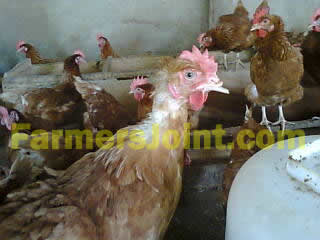Within a flock, chickens have a ranking order known as pecking order. To establish this order, there would be mild pecking and this is very normal. But when they start injuring each other, pulling out and eating feathers, and trying to kill and eat each other (cannibalism), it becomes a serious problem. Below are some tips that will help you prevent and control cannibalism and excessive pecking. These bad behaviours can spread like wild fire if not checked.
- Ensure that the flock is uniform in colour, breed, age, size and health status. Any chicken that is different in any of these characteristics can become a victim of pecking. Separate such bird to discourage the bad behaviour from starting or continuing.
- External parasites can cause excessive pecking, so check if it exists and treat accordingly.
- Avoid exposure to bright light. Red light can reduce pecking. Never use a white bulb with above 40W rating to brood birds, if more powerful bulbs are needed for more heat, use red or infrared bulbs. Also, do not provide more than 16 hours of light per day.
For broilers, give 16 hours of light per day at 0.5-2 foot-candles. For pullets, give 10-12 hours of light from 0-18 weeks at 0.5 foot-candles. When egg production starts, increase hours of light-on to 13 hours and intensity to 1-2 foot-candles. Continue to increase light duration by about 15-30 minutes per week or biweekly until 16 hours is reached at 28-32 weeks.
- Deficiency in salt and sulphur can increase the bird’s appetite for blood, resulting in cannibalism. Cannibalism has also been linked to deficiency in protein and phosphorus. Feed that are very high in energy and low in fibre also cause pecking. So provide the birds with balanced diet. This wouldn’t be a problem if you use commercial feed.
- Chickens are less likely to develop pecking and cannibalistic behaviours when they are raise on litters where they can scratch around.
- Debeak the birds (Banned in UK on Jan. 1, 2011). This involves cutting part of the beak in such a way that the lower beak is longer than the upper beak. This method is not suitable for small flocks where preventive methods can be successful.
- Keep the temperature at recommended levels. High temperature makes the flock uncomfortable and can result in pecking behaviour.
- Provide enough nest boxes and keep the nesting area dark. A bright nesting area can lead to vent pecking and cannibalism. Provide one nesting box for every 4-5 hens. For individual nests, the dimension can be: width = 25-30cm, depth = 35cm. For communal nest, it should be about 1m2 for 50 hens.
- Some breeds are more prone to cannibalism and feather eating, so buy breeds that are less prone to these behaviours.
- Avoid overcrowding.
- Gumboro disease can lead to cloacae pecking. So ensure that the birds are well vaccinated against major diseases in your area. Talk with a vet about vaccination plan.
- Ensure that the birds do not start laying too early to avoid prolapse, which is a condition where the lower part of the hen’s oviduct turns inside out and protrudes through the vent. If this happens, other hens will peck and pull at the protruding oviduct and this can eventually lead to cannibalism. Controlling feeding and lighting will ensure that the birds start to lay at the proper time.
- Provide enough feeders and drinkers so that the weaker birds can eat and drink.
Cannibalism and excessive pecking can occur when chickens are bored, so keep them busy with any combinations of the following:
- Hang vegetables and branches with leaves for them to eat and play with. Don’t allow leftovers to last till the next day since decaying matter can cause botulism.
- Give the weaker hens a place to hide when they’re under attack. It may be perches, a wooden box placed in such a way that they can hide under etc.
- Hang CDs for them to explore.
- Change objects in the pen often so that they have something new to explore.
Cannibalism and excessive pecking/feather eating are bad behaviours that should be prevented through good management. Prevention is better than trying to control them.


Leave a Reply